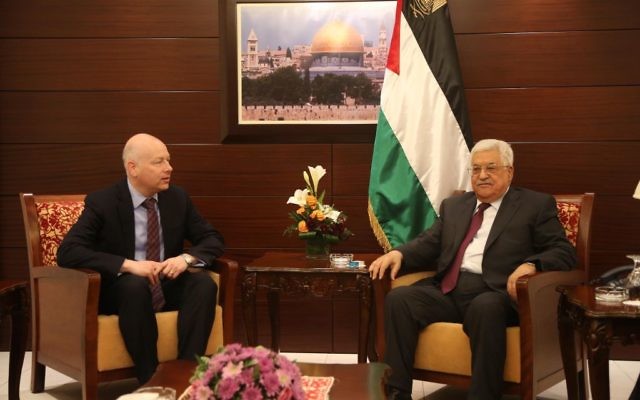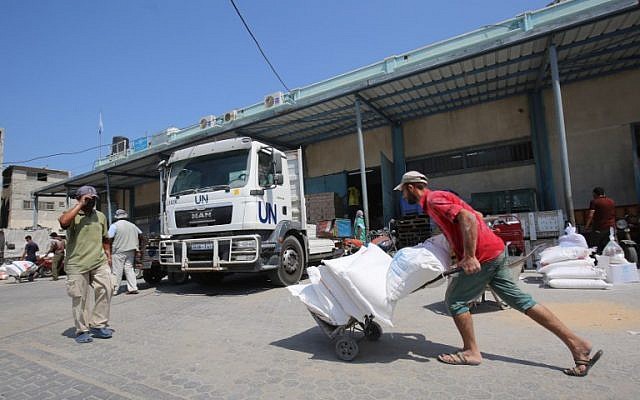Paint the Aggressor as the VICTIM???
What brainiac conjured up that fairy tale?
ISRAEL has PALESTINIANS blockaded, walled in, guarded and is killing and injuring PALESTINIANS of all ages.
ISRAEL calls for GENOCIDE, commits WAR CRIMES, is condemned by the rest of the World, bulldozes the homes of PALESTINIANS, builds illegal settlements.....
And they're the VICTIM?
Sounds like the logic of a BATTERER and WIFE BEATER.
Israel is the victim in conflict with Palestinians, says US peace envoy
Jason Greenblatt tells PBS broadcaster he ‘can’t think of single instances’ in which the Jewish state made mistakes, but concedes ‘no one is perfect’
18 July 2019
US Middle East peace envoy Jason Greenblatt said in an interview broadcast on American TV Wednesday that Israel is the victim in the conflict with the Palestinians and that in his view, has not made any mistakes over the decades the strife has continued.
In an interview with PBS, Greenblatt also said calling Israeli communities in the West Bank “settlements” is pejorative — he considers the territory “contested” rather than “occupied” — but affirmed that the Trump administration peace plan does answer the question of Palestinian self-determination.
The as-yet unveiled peace plan had its economic section published in June, envisioning a $50 billion injection to boost the Palestinian economy.
The White House has indicated that it is waiting until after a government is formed in Israel following September 17 elections before it releases the political part of the peace plan and has not revealed any of its details
Greenblatt was asked how responsible Israel is for the current situation of conflict with the Palestinians, which has continued unabated since the founding of the Jewish state in 1948.
“I think that Israel is actually more the victim than the party that’s responsible,” he replied. “From the moment of its formation, they were attacked multiple times. They continue to be attacked with terrorism. So — I’m not sure I understand the premise of the question.”
Greenblatt said he “can’t think of single instances” where Israel may have made mistakes or gone beyond its authority.
“But I think even our great country has made mistakes over the years. And, over time, you try to correct those mistakes. But I think Israel is doing the best that it possibly can under very challenging circumstances.”
“Nobody’s perfect, right?” he said.
Greenblatt also commented on the possibility of Israel annexing its settlements in the West Bank, an idea that has been floated by Prime Minister Benjamin Netanyahu and that an Israeli TV news report in May said that Washington would allow for in its peace plan. A US official later said that no such scheme was under discussion or had been proposed to the administration by Israel.
“I don’t even like the word settlements,” Greenblatt said. “I think it’s a pejorative term. I use the term neighborhoods and cities.”
“But I think that one of the challenges of this file, as people speak about the West Bank, Judea and Samaria as being occupied, I would argue that the land is disputed. It needs to be resolved in the context of direct negotiations between the parties. Calling it occupied territory does not help resolve the conflict.”
Israel gained control of the West Bank during the 1967 Six Day War. Palestinians want the territory for a future state with East Jerusalem as its capital.
Probed about what the peace plan holds for Palestinian self-determination, Greenblatt declined to reveal any details.
“I don’t want to get ahead of the plan,” he said, explaining Washington’s tight-lipped policy as a strategy to prevent the proposed agreement from coming under attack before is ready to be pitched to the Israelis and Palestinians.
“But suffice it to say that, in the roughly 60 pages of the plan, that question is answered,” he said. “And our goal is to give the Palestinians everything possible with respect to that and anything else, so long as Israel’s security is not affected in a negative way.”
The administration doesn’t use the phrase “two-state solution,” he said, because “you can’t take a complex — a conflict as complex as this and boil it down to those three words.”

US President Donald Trump’s envoy to the Middle East Jason Greenblatt meets with Palestinian leader Mahmoud Abbas in the West Bank city of Ramallah, May 25, 2017. (FLASH90)
He rejected idea that with its economic plan, titled “Prosperity to Peace,” the US was offering the Palestinians money for peace instead of land for peace.
“I will say very clearly, there is no economic peace without an acceptable political solution to both sides,” he said.
Shortly after US President Donald Trump recognized Jerusalem as Israel’s capital in December 2017 and initiated the relocation of the US embassy to Jerusalem, the Palestinians significantly downgraded their ties with Washington, including cutting relations with the White House.
Greenblatt said that Palestinians are now afraid to publicly show interest in the peace plan and that he has held many meetings with Palestinians in the region who all ask him to not publicize the talks or with whom he met.
“When they go home, they are afraid, and that’s unfortunate,” he said.
Asked if there is anyone in Palestinian society who can lead grassroots support for the peace plan, Greenblatt responded, “Unfortunately not.”
The envoy defended moves by the Trump administration that Palestinians say show a bias toward Israel, such as recognizing Jerusalem as the capital and moving the embassy to the city. The status of Jerusalem as the capital was laid down in US law that every president has promised to implement but never did until Trump, he noted.

A Palestinian man transports bags of flour outside an aid distribution center run by the United Nations Relief and Works Agency (UNRWA), in Khan Younis in the southern Gaza Strip ,on September 4, 2018. (Said Khatib/AFP)
Regarding UNRWA, the UN relief organization dealing with Palestinians from which the US cut all funding earlier this year, Greenblatt said, “It’s a broken system.”
“It keeps Palestinians living in these refugee camps in a suffering condition with no possible future. So it’s a bit unfair for the critics to say that, because of those decisions, we don’t care about Palestinians.”
Netanyahu has said he will keep an “open mind” about the US peace proposal, while Palestinian Authority President Mahmoud Abbas has vowed on many occasions to reject the US plan.
“I think people are tired of the conflict,” Greenblatt said. “I think everyone wants better lives for the Palestinians, but everyone is also willing to acknowledge the many, many challenges that exists to give them better lives to improve everything.”
“What’s at stake is, the next generation of kids are going to continue to suffer. And that would be terrible.”



No comments:
Post a Comment